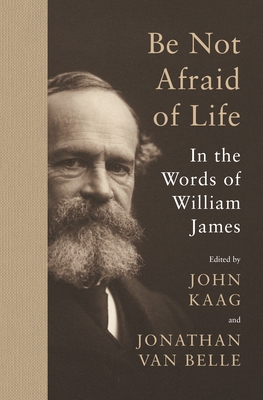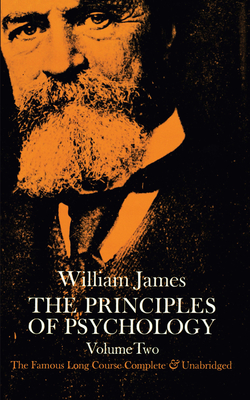



A compelling collection of the life-changing writings of William James
William James--psychologist, philosopher, and spiritual seeker--is one of those rare writers who can speak directly and powerfully to anyone about life's meaning and worth, and whose ideas change not only how people think but how they live. The thinker who helped found the philosophy of pragmatism and inspire Alcoholics Anonymous, James famously asked, is life worth living? Bringing together many of his best and most popular essays, talks, and other writings, this anthology presents James's answer to that and other existential questions, in his own unique manner--caring, humorous, eloquent, incisive, humble, and forever on the trail of the ever not quite. Here we meet a James perfectly attuned to the concerns of today--one who argues for human freedom, articulates a healthy-minded psychology, urges us to explore the stream of consciousness, presents a new definition of truth based on its practical consequences, and never forecloses the possibility of mystical transcendence. Introduced by John Kaag and Jonathan van Belle, these compelling and accessible selections reveal why James is one of the great guides to the business of living.


A compelling collection of the life-changing writings of William James
William James--psychologist, philosopher, and spiritual seeker--is one of those rare writers who can speak directly and powerfully to anyone about life's meaning and worth, and whose ideas change not only how people think but how they live. The thinker who helped found the philosophy of pragmatism and inspire Alcoholics Anonymous, James famously asked, is life worth living? Bringing together many of his best and most popular essays, talks, and other writings, this anthology presents James's answer to that and other existential questions, in his own unique manner--caring, humorous, eloquent, incisive, humble, and forever on the trail of the ever not quite. Here we meet a James perfectly attuned to the concerns of today--one who argues for human freedom, articulates a healthy-minded psychology, urges us to explore the stream of consciousness, presents a new definition of truth based on its practical consequences, and never forecloses the possibility of mystical transcendence. Introduced by John Kaag and Jonathan van Belle, these compelling and accessible selections reveal why James is one of the great guides to the business of living.
The Varieties of Religious Experience: A Study in Human Nature is a book by Harvard University psychologist and philosopher William James. It comprises his edited Gifford Lectures on natural theology, which were delivered at the University of Edinburgh, Scotland between 1901 and 1902. The lectures concerned the psychological study of individual private religious experiences and mysticism, and used a range of examples to identify commonalities in religious experiences across traditions.
Soon after its publication, Varieties entered the Western canon of psychology and philosophy and has remained in print for over a century.
James later developed his philosophy of pragmatism. There are many overlapping ideas in Varieties and his 1907 book Pragmatism.[2]



A profoundly influential figure in American psychology, William James (1842-1910) was also a philosopher of note, who used Charles S. Peirce's theories of pragmatism as a basis for his own conception of that influential philosophy. For James, this meant an emphasis on radical empiricism and the concept that the meaning of any idea -- philosophical, political, social, or otherwise -- has validity only in terms of its experiential and practical consequences.
James propounded his theories of pragmatism in this book, one of the most important in American philosophy. In a sense, he wished to test competing systems of thought in the marketplace of actual experience to determine their validity, i.e. whether adopting a particular philosophical theory or way of looking at the world makes an actual difference in individual conduct or in how we perceive and react to the varieties of experience. In these pages, James not only makes a strong case for his own ideas, but mounts a powerful attack against the transcendental and rationalist tradition.
For anyone interested in William James or the history of American philosophical thought, Pragmatism is an essential and thought provoking reference. In this handy, inexpensive edition, it will challenge and stimulate any thinking person.



William James (1842-1910) was a leading figure in Western psychology, philosophy, and psychical research. While there is an inextricable relationship between the various strands of James's work, his psychical research has been unfairly neglected in favor of classics such as The Principles of Psychology and The Varieties of Religious Experience. Read in light of one another, however, James's mainstream writings can be seen as efforts to make philosophical, metaphysical, and psychological sense of his psychical research.
Mind Dust and White Crows bridges the illusory divide, placing James's widely accepted works on mystical experience, theories of the soul, immortality, and metaphysics alongside his key writings on mediumship, telepathy, possession and other areas of psychical research. The result is a more integrated picture of James's spiritually-minded writings, transcending the disciplinary stigmas so often imposed on them. Interestingly, some of James's ideas seem to align with current interpretations of the soul and extended consciousness as derived from quantum physics.
This volume includes many rare articles, including material that has not been previously published in book form. Andreas Sommer's introduction - written especially for this volume - highlights the importance of James's work to the history and development of psychical research.


2016 Reprint of 1900 Edition. Full facsimile of the original edition, not reproduced with Optical Recognition Software. This book is divided into two sections: On A Certain Blindness in Human Beings and What Makes a Life Significant. The author tries to demonstrate how soaked and shot-through life is with values and meanings which we fail to realize because of our external and insensible point of view. The meanings are there for the others, but they are not there for us. There lies more than a mere interest of curious speculation in understanding this. It has the most tremendous practical importance. It is the basis of all our tolerance, social, religious, and political.

Brother of novelist Henry James and godson of eminent philosopher, essayist and poet Ralph Waldo Emerson, William James earned his own reputation for the monumental contributions he made in the field of Psychology. Here in his most comprehensive work on psychology, Principles of Psychology, we find a textbook which took James twelve years to complete, and which is still prevalent in the contemporary study of psychology. James' writings were influenced by Charles Darwin's ideas about adaptive evolutionary change, philosophical pragmatism, and various German psychologists who focused on the study of psychological processes. This work delves into James' assumption that developmental processes involve an interaction of nature and nurture, a view that almost all contemporary developmental psychologists hold. His fundamental theories on brain processes and abstract thought, behavioral tendencies and states of consciousness, all of which he presented a decade before Sigmund Freud, have become integral to the framework of modern social psychology. Originally published in two volumes in 1890, the complete Principles of Psychology is collected together here in one volume. This edition is printed on premium acid-free paper.

Is Life Worth Living? is a tiny book about some of life's big questions. How do you find meaning in your life? Why do people fall into despair and depression? And how can these feelings be overcome? Almost fifty years before Viktor Frankl's Man's Search for Meaning, William James discovers that feelings of pessimism and melancholy can be defeated through the power of action and struggle, and that life's meaning is created through your own actions.



